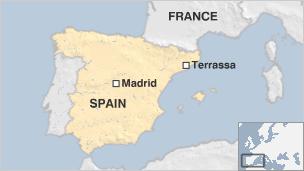Feeding Spain's jobless back to work
- Published
Some of the staff at the restaurant have been unemployed for several years
The vast majority of the staff at La Trobada restaurant in the Catalan town of Terrassa are unemployed. They volunteer as waiters, cleaners and assistant cooks at the restaurant, and in return they eat for free.
Other than four paid members of staff, including the restaurant's two head chefs, everyone working at La Trobada is working without a wage.
Over a period of four months they will each do 80 hours' work.
Dolores Roelas, 58, lost her job at the town's municipal courts three years ago and suffered severe depression.
"Suddenly I felt excluded from the world I had known for 28 years," she told me. "Being here makes me feel useful."
Diners who help
The waiters serve a three-course set menu, as well as bread, water and wine for just 6.50 euros (£5.60; $8.70).
Alfonso, who runs a business restoring classic cars, says you cannot find such good food at such a reasonable price anywhere else.
"You also help people at the same time," adds the businessman, who is one of several paying customers helping to fill the restaurant on a Monday lunchtime.
The restaurant project has received nearly 100,000 euros in funding from local and national charities and support from Terrassa's town hall.
However, the restaurant calculates that the takings from the paying customers will be 60,000 euros less than the cost of running the not-for-profit venture in its first year.
La Trobada manager Xavier Casas says they are considering increasing the cost of the set menu by one euro and also hoping to attract more sponsorship from local businesses to make the project more sustainable in the longer term.
Short-term culture
Low-paid jobs are in high demand in Spain, where as many as 1,000 people can apply for the same job.

Professor Jose Manuel Campa, a former secretary of state for the economy who now teaches at Spain's IESE business school, estimates that about 15% of the country's population is working in "very short-term conditions".
Short-term contracts provide flexibility, he notes, but "that does not encourage a long-term relationship" between employers and workers.
"In the medium term this is reflected through a very low productivity per worker, and that is not good for future growth or future welfare," he says.
Professor Salvador del Rey, an expert in Spanish labour law from the law firm Cuatrecasas, believes that "hundreds of thousands of jobs" could be cut in the public sector over the next few months.
And of the 6.2m unemployed people in Spain, there is a growing number, which the government and analysts consider to be the long-term unemployed.
The worry is that people spend so long outside of the workforce that they find it much harder getting a job, when the market in Spain finally recovers.
That is a problem which La Trobada hopes to address.
'Bigger person'
Mr Casas says the restaurant scheme is about "recuperating people for society".
"We are giving them additional tools to cope with this huge crisis," he argues.
That is a sentiment shared by Estefania Lao, 26, who has been out of work since she gave birth to her daughter five years ago.
Ms Lao cleaned, set tables and helped serve the food on the day I visited.
"We work in exchange for a meal but it's not just about the food - it is the fact that you get out of the house and you meet people," she says.
"In my case I have done nothing apart from care for my daughter for the past five years. This makes me a bigger person."